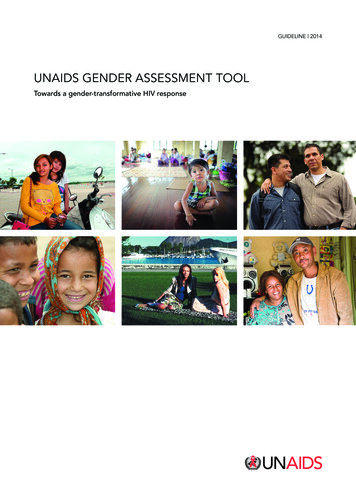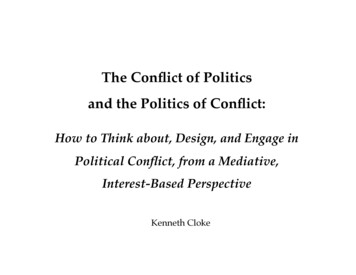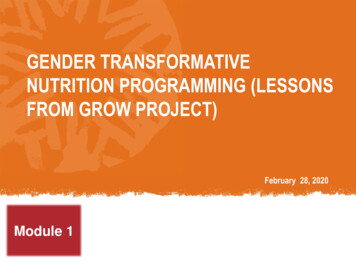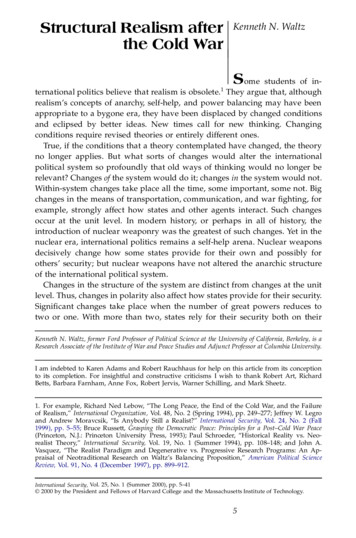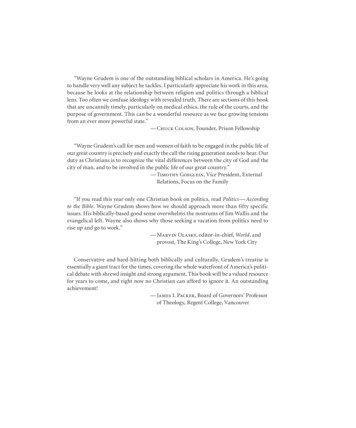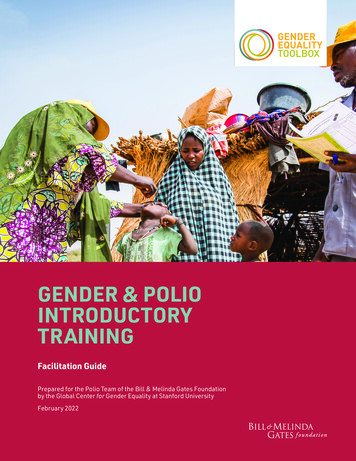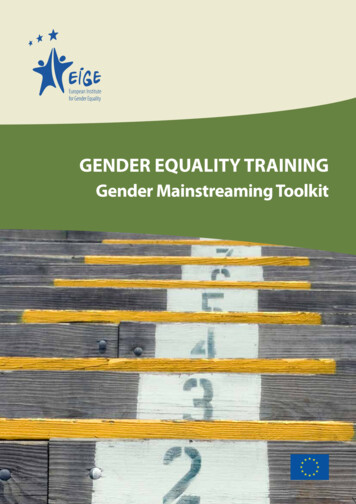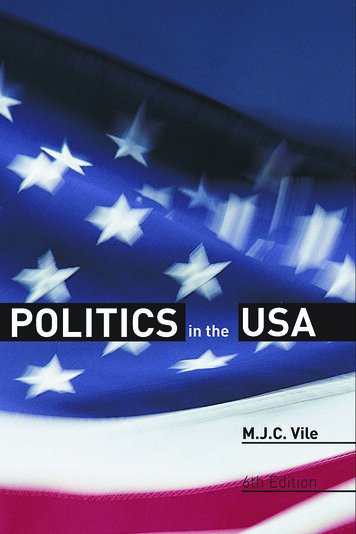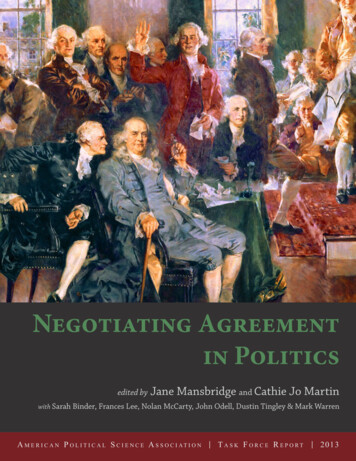
Transcription
Palgrave MacmillanPlease respect intellectual property rightsThis material is copyright and its use is restricted by our standard site licand conditions /terms conditions.html)to copy, distribute or share in any format including, for the avoidance ofposting on websites, you need the express prior permission of PalgraveTo request permission please contact rights@palgrave.com.
10.1057/9780230617742 - Gender and Global Politics in the Asia-Pacific, Katrina Lee-Koo and Bina D'CostaCopyright material from www.palgraveconnect.com - licensed to UNIVERSITY OF AUCKLAND - PalgraveConnect - 2015-10-19Gender and Global Politicsin the Asia-Pacific
10.1057/9780230617742 - Gender and Global Politics in the Asia-Pacific, Katrina Lee-Koo and Bina D'CostaCopyright material from www.palgraveconnect.com - licensed to UNIVERSITY OF AUCKLAND - PalgraveConnect - 2015-10-19This page intentionally left blank
Edited by Bina D’Costa and Katrina Lee-Koo10.1057/9780230617742 - Gender and Global Politics in the Asia-Pacific, Katrina Lee-Koo and Bina D'CostaCopyright material from www.palgraveconnect.com - licensed to UNIVERSITY OF AUCKLAND - PalgraveConnect - 2015-10-19Gender and Global Politicsin the Asia-Pacific
gender and global politics in the asia-pacificCopyright Bina D’Costa and Katrina Lee-Koo, 2009.First published in 2009 by PALGRAVE MACMILLAN in the United States—a division of St. Martin’s Press LLC, 175 Fifth Avenue, New York, NY 10010.Where this book is distributed in the UK, Europe and the rest of the world, thisis by Palgrave Macmillan, a division of Macmillan Publishers Limited, registeredin England, company number 785998, of Houndmills, Basingstoke, HampshireRG21 6XS.Palgrave Macmillan is the global academic imprint of the above companies andhas companies and representatives throughout the world.Palgrave and Macmillan are registered trademarks in the United States, theUnited Kingdom, Europe and other countries.ISBN-13: 978-0-230-61160-3ISBN-10: 0-230-61160-5Library of Congress Cataloging-in-Publication Data is available from the Libraryof Congress.A catalogue record of the book is available from the British Library.Design by Scribe Inc.First edition: January 200910 9 8 7 6 5 4 3 2 1Printed in the United States of America.10.1057/9780230617742 - Gender and Global Politics in the Asia-Pacific, Katrina Lee-Koo and Bina D'CostaCopyright material from www.palgraveconnect.com - licensed to UNIVERSITY OF AUCKLAND - PalgraveConnect - 2015-10-19All rights reserved.
It is dedicated to our mothers,Sabita D’Costa and Valmai Lee-Koo10.1057/9780230617742 - Gender and Global Politics in the Asia-Pacific, Katrina Lee-Koo and Bina D'CostaCopyright material from www.palgraveconnect.com - licensed to UNIVERSITY OF AUCKLAND - PalgraveConnect - 2015-10-19This book is written in honor of Jindy Pettman,a great scholar and our mentor
10.1057/9780230617742 - Gender and Global Politics in the Asia-Pacific, Katrina Lee-Koo and Bina D'CostaCopyright material from www.palgraveconnect.com - licensed to UNIVERSITY OF AUCKLAND - PalgraveConnect - 2015-10-19This page intentionally left blank
Preface: How Jindy Pettman Redrew My Mental MapCynthia EnloeixList of ContributorsxiAcknowledgmentsxvList of AcronymsxviiPart I: ‘Living in the Margins’: Gendering the Global11Critical Feminist International Relations in the Asia-PacificBina D’Costa and Katrina Lee-Koo32‘Worlding Women’ in International LawHilary Charlesworth193Gendered Economies in the Asia-PacificV. Spike Peterson39Part II: Gendering Global Politics in the Asia-Pacific4The ‘Kitsch’ of War: Misappropriating Sun Tzufor an American Imperial HypermasculinityChing-Chane Hwang and L. H. M. Ling57595When the UN ‘Succeeds’: The Case of CambodiaSandra Whitworth776Feminizing Global GovernanceShirin M. Rai9510.1057/9780230617742 - Gender and Global Politics in the Asia-Pacific, Katrina Lee-Koo and Bina D'CostaCopyright material from www.palgraveconnect.com - licensed to UNIVERSITY OF AUCKLAND - PalgraveConnect - 2015-10-19Contents
ContentsPart III: ‘Worlding Women’:Confronting Gendered Politics in Asia789113Confessions of a Failed Feminist IR Scholar:Feminist Methodologies in Practice in PeshawarAnne McNevin115One Woman’s Everyday Resistance:An Empowering Yet Cautionary Tale from VietnamKim Huynh129Women’s Engagement with Islam in South and Southeast AsiaShakira HusseinPart IV: Linking Local with Global:Feminist Activism in the Pacific14315710 Gender Mainstreaming in a Post–conflict State:Toward Democratic Peace in Timor-Leste?Nina Hall and Jacqui True15911 Shifting Terrains of Transnational Engagement:Women’s Organizing in FijiNicole George17512 Reclaiming Pacific Island Regionalism:Does Neoliberalism Have to Reign?Claire Slatter and Yvonne Underhill-Sem19513 A Feminist Politics of Region?:Reflecting and Revisioning IR from Asia and the PacificJindy Pettman211AfterwordJ. Ann 7742 - Gender and Global Politics in the Asia-Pacific, Katrina Lee-Koo and Bina D'CostaCopyright material from www.palgraveconnect.com - licensed to UNIVERSITY OF AUCKLAND - PalgraveConnect - 2015-10-19viii
How Jindy Pettman RedrewMy Mental MapCynthia EnloeI was trained at Berkeley in the sixties to be an Asian specialist, but I had neverbeen to the Pacific. True, thanks to the British imperialists’ manipulations ofmilitarized ethnicities, I had given some passing thought to Fiji. Yet I wouldhave been hard-pressed to find it on a globe. Jindy Pettman changed all this.It was the winter of 1990 in the southern hemisphere when I took up a shortterm visiting post at Australian National University’s Pacific Peace ResearchCentre. From our nice, small apartment on campus, we could see a dustingof July snow on the distant hills outside Canberra. Everyone at the Centre wasvery welcoming. Many of the senior staff was working on concepts and practices of the relationships that shape security among states in the Pacific. Listening to them in conversation and in seminars, I began to get my first sense of thePacific as the newly imagined ‘back yard’ of Australia—the way the Caribbeanfor two centuries has been the so-called back yard of the United States (at leastin the minds of many expansionist Americans).At the time, Jindy Pettman was doing work and teaching courses at a skeptical arm’s length from this core institutional inquiry. As she and I began to haveconversations–and walks and meals–I realized that there was quite a differentway to become Pacific-conscious. Jindy was energetically asking two fresh questions. First, how were women from Australia’s newer immigrant communities,that is, women from backgrounds other than white British or Aborigine—experiencing Australian sociopolitical life and making their diverse marks uponit? Second, how were women from the many small island nations of the Pacificexperiencing their relationships to Australia as it was newly flexing its regionalmuscles? All of this was new to me. I had never before thought about the politicsof Italian, Lebanese, or Filipino Australian women as political actors in anyefforts to make sense of the dynamic relationships between racism(s), the state,men, and international politics. On top of this, until these lively conversationswith Jindy that July, I had never wondered how Papua New Guinean, Fijian,10.1057/9780230617742 - Gender and Global Politics in the Asia-Pacific, Katrina Lee-Koo and Bina D'CostaCopyright material from www.palgraveconnect.com - licensed to UNIVERSITY OF AUCKLAND - PalgraveConnect - 2015-10-19PREFACE
PrefaceNew Calendonian or Cook Island women could—if only I would pay closeattention—help me make better sense of the post–cold war international order.Jindy Pettman was doing two things simultaneously: first, she was urging usto lift the ungendered curtain on Australia as an interstate actor, so we wouldbe far more realistic about the ways conventional analyses of foreign policy andregional politics mask masculinized privilege. At the same time, she was revealing that women from marginalized local communities and vulnerable islandnations could be political actors in their own right, activist thinkers from whomthe rest of us could learn.The Asian Studies Association of the United States—a major academicinstitution—still does not include Pacific nations’ histories, economies, politics,or gendered dynamics in their purview. As a result, for instance, almost no feminist researchers in the northern hemisphere (outside of Hawaii’s lively feministcircles) are asking how Fijian women are responding to global, private militarycontractors recruiting ethnic Fijian men into their ranks for service in Iraq andother war zones. If it weren’t for Jindy’s initial personal tutoring back in 1990,her subsequent out-pouring of influential writings, her work reshaping the discipline within the International Studies Association, and her role as a foundingeditor of The International Feminist Journal of Politics, perhaps I would stillbe satisfied to let my feminist curiosity taper off somewhere in the vicinity ofIndonesia and the Philippines. But having had my mental map redrawn byJindy Pettman’s feminist curiosity, that intellectual laziness is, thankfully, nolonger possible.Each of the provocative contributions that follow here reflects the impactJindy Pettman’s widely read writings, organizing skills, and dedicated teachinghave had on the questions we now ask, and where in the world we go to seekanswers to those questions.Thanks, Jindy.10.1057/9780230617742 - Gender and Global Politics in the Asia-Pacific, Katrina Lee-Koo and Bina D'CostaCopyright material from www.palgraveconnect.com - licensed to UNIVERSITY OF AUCKLAND - PalgraveConnect - 2015-10-19x
Hilary Charlesworth is a Professor of International Law and Human Rightsand Director of the Centre for International Governance and Justice (CIGJ) atthe Australian National University. Her research interests include the relevanceof feminist theory to understanding international law, the structure of the international human rights system, and the protection of human rights in Australia.She has worked with various non-governmental human rights organizations onways to implement international human rights standards. She is Patron of theACT Women’s Legal Service. In 2005, she was awarded a Federation Fellowshipby the Australian Research Council.Bina D’Costa is a Research Fellow at the Center for International Governanceand Justice (CIGJ) at the Australian National University (ANU). Most of thework for this book was completed while she was the Convener of the SecurityAnalysis program at the Faculty of Asian Studies, the ANU. Bina is currentlyworking on a project titled “Elusive Justice: Reconciliation Processes and Peacebuilding in Asia” and two other smaller research projects titled “DisappearedGeneration: Children Conceived through Violent Conflict and National Identity in South Asia” and “Peacekeeping Forces from South Asia.” Bina has workedon historical injustices, truth, and memory in relation to the strategies of civilsociety in demanding justice when there is a hostile government in power. Thisaction-oriented research informs her book manuscript titled “‘Burden’ of theState: Engendering War Crimes and National Identity Politics in PostcolonialSouth Asia.”Cynthia Enloe is Research Professor at Clark University in Massachusetts.Among her recent books are The Curious Feminist: Women in a New Age ofEmpire and Globalization and Militarism: Feminists Make the Link.Nicole George holds the position of John Vincent Post-Doctoral Fellow in theDepartment of International Relations at the Research School of Pacific andAsian Studies, Australian National University. She lectures in the areas of gender, globalization, and development. She is currently preparing a book manuscript from her doctoral research, which examines women’s political agency and10.1057/9780230617742 - Gender and Global Politics in the Asia-Pacific, Katrina Lee-Koo and Bina D'CostaCopyright material from www.palgraveconnect.com - licensed to UNIVERSITY OF AUCKLAND - PalgraveConnect - 2015-10-19Contributors
xii ContributorsNina Hall is a Masters student in Political Studies at the University of Auckland. Her thesis examines post–conflict reconstruction and democratization inTimor-Leste from a gendered perspective. Her fields of expertise include genderand development, identity politics, and regime transitions. On completion of herMasters, she plans to complete a Ph.D. in political studies. Nina is also involvedwith the environmental and social justice movement in New Zealand.Kim Huynh is a lecturer in politics and international relations at the Australian National University. He has published articles in Alternatives and Frontiers:A Journal of Women Studies. His memoir, Where the Sea Takes Us, publishedby HarperCollins in 2007, tells the story of his parents’ lives during and afterthe Vietnam War. He has co-edited The Culture Wars: Australian and AmericanPerspectives published by Pan MacMillan in 2008, and has contributed articlesto ABC Radio National, The Canberra Times, The Daily Telegraph, and The Adelaide Advertiser.Shakira Hussein is completing her Ph.D. on encounters between Western andMuslim women at the Australian National University. Her publications include“The War on Terror and the Rescue of Muslim Women” in Islam in World Politics, edited by Nelly Lahoud and Anthony Johns (Routledge, 2005) as well asmany online and newspaper editorials relating to questions of Muslim identitiesin Australia.Ching-Chane Hwang is Associate Professor at the Graduate Institute of Political Science, National Sun Yat-sen University, Taiwan. She is interested in feminist political theories and international relations theories.Katrina Lee-Koo is a Lecturer in International Relations at the AustralianNational University. Her research interests include critical security studiesand feminist international relations. She has recently contributed chapters to:Anthony Burke and Matt McDonald, eds, Critical Security in the Asia-Pacific(Manchester University Press, 2007); Alex Bellamy, et al., ed., Security and theWar on Terror (Routledge, 2008) and Richard Devetak, et al., ed., An Introduction to International Relations: Australian Perspectives.L. H. M. Ling is an Associate Professor in the Graduate Program in International Affairs at The New School in New York City. Ling’s research interestsinclude democracy in international relations, critical security studies, transcultural politics and postcolonial discourses, and her geocultural area of interestcenters on East, South-East, and South Asia and its relations with the West. Herbooks include Postcolonial International Relations: Conquest and Desire betweenAsia and the West (London: Palgrave Macmillan, 2002) and Transforming World10.1057/9780230617742 - Gender and Global Politics in the Asia-Pacific, Katrina Lee-Koo and Bina D'CostaCopyright material from www.palgraveconnect.com - licensed to UNIVERSITY OF AUCKLAND - PalgraveConnect - 2015-10-19women’s organizing in the Pacific region. Her other research interests includegender and civil society, gender and peacebuilding, women’s regionalism, andPacific masculinities.
Contributors xiiiAnne McNevin is a Research Fellow in the Globalism Research Centre, RMITUniversity, Melbourne. Her work engages issues of citizenship, political belonging, irregular migration, and neoliberal globalization. She has published onthese themes in Citizenship Studies, Review of International Studies and The Australian Journal of Political Science. She is currently undertaking research on thedynamics of citizenship and irregular migration in Kuala Lumpur, Melbourne,and Los Angeles.V. Spike Peterson is Professor in the Department of Political Science at theUniversity of Arizona, with courtesy appointments in Women’s Studies, Institute for LGBT Studies, Center for Latin American Studies, and InternationalStudies. She has published extensively on the topics of feminist internationalrelations theory, global political economy, nationalism, heterosexism, and critical poststructuralist feminist theory. Her most recent book, A Critical Rewriting of Global Political Economy: Integrating Reproductive, Productive and VirtualEconomies, examines intersections of ethnicity and race, class, sex and gender,and national hierarchies in the context of neoliberal globalization. Her currentresearch investigates informalization and ‘coping, combat and criminal economies’ in conflict zones.Jindy Pettman is an Emeritus Professor of the Australian National University.She is the author of Worlding Women: A Feminist International Politics (Allen &Unwin, Routledge, 1996); Living in the Margins: Racism, Sexism and Feminismin Australia (1996), and numerous book chapters and journal articles. She is thefounding editor of the International Feminist Journal of Politics (Routledge) andin 2003 was named Eminent Scholar by the International Studies Association.Shirin M. Rai is Professor in the Department of Politics and InternationalStudies at the University of Warwick. She is Director of the Taught Masters(MA) Programme in Globalization and Development and of a Leverhulme TrustProgramme on Gendered Ceremony and Ritual in Parliament. Her researchinterests lie in the area of feminist politics, democratization, globalization, anddevelopment studies. She has consulted with the United Nations’ Division forthe Advancement of Women and UNDP. She is a founding member of theSouth Asia Research Network on Gender, Law, and Governance and is on theeditorial board of International Feminist Journal of Politics, Global Ethics andIndian Journal of Gender Studies. She is the co-editor (with Wyn Grant) of Perspectives on Democratic Practice.10.1057/9780230617742 - Gender and Global Politics in the Asia-Pacific, Katrina Lee-Koo and Bina D'CostaCopyright material from www.palgraveconnect.com - licensed to UNIVERSITY OF AUCKLAND - PalgraveConnect - 2015-10-19Politics: From Empire to Multiple Worlds (London: Routledge, forthcoming),co-authored with Anna M. Agathangelou of York University. Ling’s publicationshave appeared in International Feminist Journal of Politics, International StudiesQuarterly, International Studies Review, Journal of Peace Research, Millennium,Positions, Review of International Political Economy, and Review of Politics.
ContributorsClaire Slatter is a Fiji national and a graduate of the University of the SouthPacific, Australian National University, and Massey University. She has a background in the women’s anti-nuclear and trade union movements and is a founding member (and former General Coordinator) of the Third World feministnetwork, Development Alternatives with Women for a New Era (DAWN), theCitizens’ Constitutional Forum in Fiji and the Pacific Network on Globalisation (PANG). She taught in the Department of History and Politics for seventeen years and now works as a freelance economic and social policy researcherand analyst.J. Ann Tickner is Professor, School of International Relations at the Universityof Southern California. She is the author of Gender in International Relations:Feminist Perspectives on Achieving Global Security (1992) and Gendering WorldPolitics: Issues and Approaches in the post-Cold War Era (2001).Jacqui True (Ph.D, York University, Canada) is a senior lecturer in internationalrelations at the University of Auckland. Her research interests include genderand international relations, global governance and gender mainstreaming, andfeminist methodologies. Her publications include Gender, Globalization andPostsocialism (Columbia University Press, 2003), and with Brooke Ackerly andMaria Stern, Feminist Methodologies for International Relations (Cambridge University Press, 2006). She is currently working on regional organizations andtheir efforts to promote gender equity within trade policymaking and tradeagreements.Yvonne Underhill-Sem is currently Director of the Centre for DevelopmentStudies at the University of Auckland, New Zealand. Since 1999, she has beenPacific Regional Co-ordinator for DAWN (Development Alternatives withWomen for a New Era). She is a feminist development geographer who hasongoing research interests in Papua New Guinea, the Cook Islands (her country of heritage), and the Pacific in general. She has lived and worked in NZ,the Cook Islands, Hawaii, Papua New Guinea, Samoa, Germany, Brussels, andAustralia where she has taught and undertaken research and advocacy as anacademic, an advocate, and a development practitioner.Sandra Whitworth is Professor of Political Science at York University inToronto, Canada. Her first book, Feminism and International Relations (Palgrave Macmillan) was published in 1994, translated into Japanese, and published by Fujiwara Shoten Press in 2000. Her most recent book, from which thechapter in this collection is drawn, was published in 2004 (Lynne Rienner) andis entitled Men, Militarism and UN Peacekeeping: A Gendered Analysis. She iscurrently serving as the Graduate Program Director in Political Science at York,and as the home base editor for International Feminist Journal of Politics.10.1057/9780230617742 - Gender and Global Politics in the Asia-Pacific, Katrina Lee-Koo and Bina D'CostaCopyright material from www.palgraveconnect.com - licensed to UNIVERSITY OF AUCKLAND - PalgraveConnect - 2015-10-19xiv
Nearly two years ago, we decided to write this book as a tribute to Jindy Pettman. Jindy’s guidance continues to be invaluable on our respective intellectualjourneys. Thank you Jindy, for your generosity, your vision, your kindness, andyour heart.Each contributing author has a special connection to Jindy—as a former student, colleague, or fellow pioneer in feminist scholarship. All authors enthusiastically responded to our call to produce this tribute. This demonstrates that theenduring links among feminists are based not only on intellectual practices butforged through personal friendships, alliances, and mutual respect. We wouldlike to thank all our contributors for their hard work on this book.This book has greatly benefited from the comments and suggestions madeby several people who read earlier drafts and who gave us valuable advice. Inparticular, we are grateful to Greg Fry, who encouraged us to embark on thisproject. We also thank our colleagues at the Australian National University fortheir support. We would further like to thank our many Palgrave partners fortheir support, encouragement and hard work on this project.Finally, thanks to David Kilham and Andrew Watts for their commitment tous and assistance to this project.10.1057/9780230617742 - Gender and Global Politics in the Asia-Pacific, Katrina Lee-Koo and Bina D'CostaCopyright material from www.palgraveconnect.com - licensed to UNIVERSITY OF AUCKLAND - PalgraveConnect - 2015-10-19Acknowledgments
10.1057/9780230617742 - Gender and Global Politics in the Asia-Pacific, Katrina Lee-Koo and Bina D'CostaCopyright material from www.palgraveconnect.com - licensed to UNIVERSITY OF AUCKLAND - PalgraveConnect - 2015-10-19This page intentionally left blank
ADBASEANCEDAWAsian Development BankAssociation of Southeast Asian NationsConvention on the Elimination of All Forms ofDiscrimination against WomenCPPThe Cambodian People’s PartyCNRTNational Council of East Timorese ResistanceCROPCouncil of Regional Organizations in the PacificDAWNDevelopment Alternatives for Women in a New EraECOSOCThe Economic and Social CouncilEPAEconomic Partnership AgreementFUNCINPEC National United Front for an Independent, Neutral,Peaceful and Co-operative CambodiaFWCCFiji Women’s Crisis CentreFWRMFiji Women’s Rights MovementGAUTimor-Leste’s Gender Affairs UnitICRCInternational Committee of the Red CrossIMFInternational Monetary FundINTERFETInternational Force East TimorKPNLFKhmer People’s National Liberation FrontOPMTPopular Women’s Organization of Timor-LestePACERPacific Agreement on Closer Economic RelationsPDKKhmer Rouge (Party of Democratic KampucheaPFABeijing Platform for ActionPIFSPacific Islands Forum SecretariatRAWARevolutionary Association of the Women of AfghanistanSEPITimor-Leste’s Secretary of State for Promotion of EqualitySGBVSexual and Gender-based ViolenceSPCSouth Pacific CommunityTRIPSTrade-Related Aspects of Intellectual Property RightsUNAMICUnited Nations Advance Mission in CambodiaUNBROUnited Nations Border Relief Operation10.1057/9780230617742 - Gender and Global Politics in the Asia-Pacific, Katrina Lee-Koo and Bina D'CostaCopyright material from www.palgraveconnect.com - licensed to UNIVERSITY OF AUCKLAND - PalgraveConnect - 2015-10-19Acronyms
ce of the United Nations High Commissionerfor RefugeesUnited Nations Children’s FundUnited Nations Development Fund for WomenUnited Nations Transitional Authority in CambodiaUnited Nations Transitional Authority in East TimorWomen’s Development ProjectWorld Trade OrganizationYoung Women’s Christian Association10.1057/9780230617742 - Gender and Global Politics in the Asia-Pacific, Katrina Lee-Koo and Bina D'CostaCopyright material from www.palgraveconnect.com - licensed to UNIVERSITY OF AUCKLAND - PalgraveConnect - 2015-10-19xviii
‘Living in the Margins’Gendering the Global10.1057/9780230617742 - Gender and Global Politics in the Asia-Pacific, Katrina Lee-Koo and Bina D'CostaCopyright material from www.palgraveconnect.com - licensed to UNIVERSITY OF AUCKLAND - PalgraveConnect - 2015-10-19PART I
10.1057/9780230617742 - Gender and Global Politics in the Asia-Pacific, Katrina Lee-Koo and Bina D'CostaCopyright material from www.palgraveconnect.com - licensed to UNIVERSITY OF AUCKLAND - PalgraveConnect - 2015-10-19This page intentionally left blank
Critical Feminist InternationalRelations in the Asia-PacificBina D’Costa and Katrina Lee-KooIn a review appearing on the back cover of Jindy Pettman’s 1996 book Worlding Women, Cynthia Enloe suggests that the value of the work is its brazen courage to ask simple questions about international relations. WorldingWomen poses questions like, “What can a Filipina mail-order bride living inSydney, Australia tell us about lofty theorizing in international politics?” Theanswer, Enloe replies, is “a lot.” Through Worlding Women, Jindy Pettman is oneof the pioneers of the project “to make visible places and ways that women are inthe world.”1 Like Enloe’s own work, and the work of many since, the straightforward, yet extraordinary value of critical feminist investigations into international relations demonstrates a curiosity regarding how international relationsaffects and is affected by gendered identities. To those outside the discipline ofinternational relations (IR) this may seem a simple task, yet feminists workinginside the discipline know that that is exactly what it is not. It is a testament tothe foundationally unsettling nature of critical feminist IR that feminists havefaced decades of difficulties in having questions of gender taken seriously. Thisis because such an enquiry encourages us to challenge the boundaries of thediscipline of ‘international relations’ by exploring the totality of ‘global politics.’While the discipline of international relations reserves its reference for the ‘highpolitics’ of statecraft in the international system, critical feminist IR scholarsconcern themselves with the breadth of global politics. Here feminists find thatpolitics pervades the everyday lives of ordinary, gendered identities the worldover in ways that are both welcome and pernicious, empowering, and oppressive. The primary goals of this book are to map feminist accounts of global politics in the Asia-Pacific region and situate these accounts in the field of criticalfeminist international relations.When considering the approach of critical feminist international relations,it is worthwhile to reiterate there are many feminisms2 that comprise the fieldof feminist international relations. With this in mind, Jill Steans argues all10.1057/9780230617742 - Gender and Global Politics in the Asia-Pacific, Katrina Lee-Koo and Bina D'CostaCopyright material from www.palgraveconnect.com - licensed to UNIVERSITY OF AUCKLAND - PalgraveConnect - 2015-10-19CHAPTER 1
Bina D’Costa and Katrina Lee-Koofeminist approaches to international relations have four goals: to highlight theexclusions and biases of mainstream IR; to make women visible in internationalpolitics; to understand the causes of gender inequalities in the disciplinary studyand practice of IR; and finally, “to empower women as subjects of knowledgeby building theoretical understandings of IR from the position of women andtheir lived, embodied experiences.”3 Yet while it may be possible to say that allfeminisms share recognition of women’s general subordination to men and acommitment to equality between men and women in public and private life,it is difficult to generalize beyond that.4 Debates within feminism are immediately generated by questioning, for instance, what constitutes subordinationand equality between gendered identities and how equality and indeed, emancipation, might be achieved. Decades of feminist politics have demonstratedthat universalist claims by scholars on the behalf of all women are not so easy tomake and are highly problematic. Recognition of the difficulty associated withthinking through the multiple sources of insecurity and opportunity that confront women in specific political contexts leads us to a critical feminist readingof the Asia-Pacific and its relations with the rest of the world.Consequently, this collection foregrounds one of the most dynamic, changing, and, some strategic theorists surmise, potentially threatening regions ofthe world. IR scholars often identify the Asia-Pacific as incorporating the economically and politically volatile So
Masters, she plans to complete a Ph.D. in political studies. Nina is also involved with the environmental and social justice movement in New Zealand. Kim Huynh and , , and . Katrina Lee-Koo and the . 10.1057/9780230617742 - Gender and Global Politics in the Asia-Pacific, Katrina Lee-Koo and Bina D'Costa veConnect - 2015-10-19
